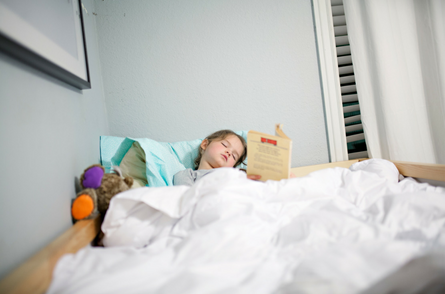It is so important for your child to start off a new school year well-rested. A well-rested child will display better cognitive abilities, a more pleasant mood and temperament as well as a stronger immune system. But even if you are making sure that your child’s sleep environment and bedtime are appropriate, that doesn’t always mean that falling asleep will come easy for them.
Sleep issues related to anxiety among kids ages 5 and up happen more often than you may think. Big life changes, new situations, social developments and even scary thoughts can often cause anxiety that makes it hard for your big kids to wind down and get the restorative sleep they need.
Sign Up For Our Newsletter
Tips For Reducing Bedtime Anxiety In Children
In addition to having a consistent bedtime routine for your child, there are other things you can do when helping your anxious child fall asleep, like teaching your child tools to help them calm both their body and their mind. It’s never too early to teach your child to combat anxieties and fears before bedtime with communication and relaxation techniques.
It’s also important to take the pressure of sleep from both of you to avoid a stressful cycle developing. Your child will stress before bedtime because he knows he’s going to have a hard time falling asleep and then you and he may have conflict about it, stressing you both out where no one is falling asleep any time soon. Kids can even feel the pressure by just hearing a parent tell them it’s time to go to bed.
Building attachment with your child at bedtime and having open communication about what’s going on in your child’s life can really reduce anxieties. Spending quality and focused time together will help them feel safe and secure and they will feel more inclined to share their stresses and fears and allow you to help them deal with any anxiety they are feeling. Here are some tips to help build attachment and reduce bedtime anxiety:
- Try a lot of open-ended questions and ask them while you’re doing certain activities together, like colouring.
- Make yoga a part of your bedtime routine! This is a great way for kids to relax, reduce stimulation and quiet their minds. (And a great book for teaching kids mindfulness is this one: Sitting Still Like a Frog.)
- Cuddling, talking and being available to your child at bedtime builds attachment and promotes fewer night wakings.
- Repeat positive sleep mantras like “I can fall asleep on my own,” “I’m a great sleeper,” “Sleep is good for me.” Repeat these mantras at bedtime and even throughout the day with your child to change the way they think about bedtime from negative to positive.
- Create a shared journal between you and your child. In this journal your child is able to write down any worries or concerns that they want you to know about and there is an understanding that you will read it. Sometimes it’s difficult for our children to admit their fears out loud but they want to share them with us. This shared journal can act as that bridge for communication between the two of you.
- Read Generation Stressed – Play-Based Tools to Help Your Child Overcome Anxiety by Michele Kambolis. Michele has created play-based tools that parents can use with their child to relieve anxiety and easy to use strategies that can be applied to all children’s anxiety-related thinking traps.
- What kids and teens may see or read right before bed can trigger anxiety – make a family docking station to keep technology out of bedrooms.
- Sit down for a family meeting and create family sleep rules. Map out the bedtime routine through pictures or verbally so that your child is clear on the expectations at bedtime and throughout the night.
Are you ready for your child to sleep better? Find out more about our tween and teen one-on-one program to help your family sleep better.
Getting The Sleep They Need
Some big kids still need an early-ish bedtime to avoid being overtired. Try moving your child’s bedtime 30 minutes earlier than normal for a week straight to see what kind of results you achieve. Calming your mind and your body is that much harder to do when you are overtired. All school aged children, right through to high school, should still be aiming for 10-11 hours of sleep per night.
Ready to get started on a path to better sleep? Good Night Sleep Site helps families and kids of all ages tackle sleep issues and learn how to sleep well again. Our support and guidance will give you the confidence to become your family’s sleep expert and keep everyone well rested and happy! You can get started by finding your local Good Night Sleep Site consultant or connecting with our Facebook Community Group.

Alanna McGinn is a Certified Sleep Consultant and Founder of Good Night Sleep Site – a Global Pediatric and Family Sleep Team. She provides free child and family sleep support through her Facebook, Twitter, and Instagram. She invites you to join her sleep community as she works towards Good Night Sleep Site’s mission of a healthier rested family unit. For more sleep tips please visit Good Night Sleep Site. Join our movement and #BringBackBedtime.











